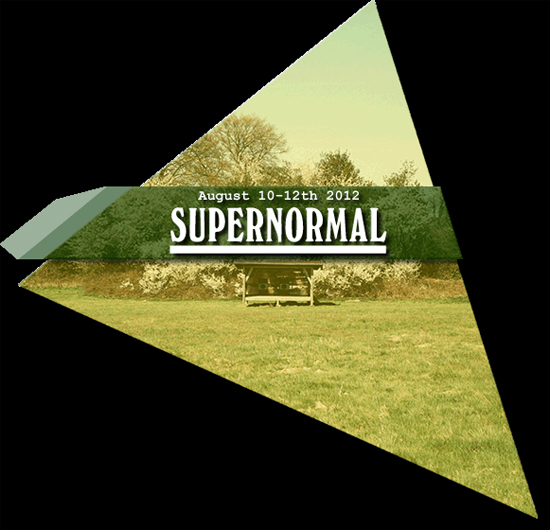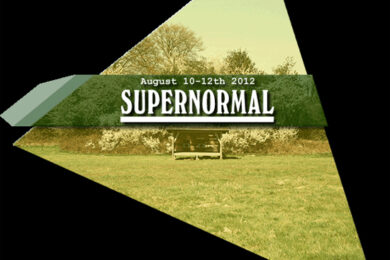The latest edition of Supernormal, an annual festival of art and music which each year gathers together a formidable array of underground talent, takes place at Brazier’s Park, Oxfordshire, between 10th and 12th August.
It’s been a rough year for the festival circuit, with several events cancelled due to various circumstances and generally low ticket sales. However, it’s nice to see that low-key, not-for-profit, community-based events are still pressing onward regardless. Supernormal – featuring artists like Seefeel, Ramesses, James Blackshaw and Sly & The Family Drone, and with as much a focus on visual art as on music – is a great example. Alongside a host of musicians (you can see the full line-up here), the festival’s aim is also to provide a platform for contemporary arts, which includes impromtu performances and installations, all of which, organiser Keran James explains, aims to be the "furniture as well as the feature of the event". For a bit of a taster, you can watch a documentary shot during last year’s event, entitled Supernormal: Love Each Other Or Die, below.
SUPERNORMAL – LOVE EACH OTHER OR DIE from Andy Moore on Vimeo.
Tickets for the weekend are priced at £65, and you can buy them via the Supernormal website.
In advance of the festival, we fired across a few questions to the organisers for a personal low-down on Supernormal’s ethos and appeal, and some details about this year’s event.
How would you sum up Supernormal? Even just from the blurb on your site and the focus on shared ideas and community, your attitude seems distinct from pretty much anything else out there.
Colin (Tatty Seaside Town): Yes, it is very distinct from anything out there; that’s what drew me to it – first as a punter last year, which in turn led me to get involved in a curatorial capacity this year. The focus on shared ideas and community is something that I haven’t seen in the festival medium since the likes of Deeply Vale in the Seventies. In the intervening decades, I’ve dabbled with the odd Glastonbury or Reading, and the acceleration into big business, corporate sponsorship, catering for the lowest common denominator and middle-class acceptance has been frankly depressing. Today there are more festivals in this country than ever and you see the same bands on every bill. It’s become a treadmill. Supernormal truly gets back to basics I feel, not in any hippy trustafarian ‘smash the system’ kinda way, but on an alternative/underground music and art level. It’s run on a shoestring by people who care, and I think this reflects in the programme.
Jimmy Martin: I think the fact that the festival evolved from the Braziers Park community, a centre for social research with fifty plus years history of interrogating the status quo, gave it a different slant right from the off. I don’t feel like Supernormal is the same kind of beast at all as blizzard-of-commerce festivals like V and Lovebox; whatever embroidery these events employ, they tend to always end up being essentially the same big field with two or three stages in them. I think the unpredictability of the art side at Supernormal and the earthiness of the music side make good bedfellows. The great thing is that you’re genuinely never sure exactly what’s going to happen next.
When did the idea for Supernormal first begin to take shape, and what was the impetus to put on the first one? When was the first edition of the festival? Did you set out with a specific ethos in mind, and has that evolved over time?
JM: It evolved from the artists’ workshop that takes place at Braziers Park every year; the idea originally when Supernormal was set up, as its original organiser Siena Barnes put it, was ‘a radical experiment in visual and sonic disciplines driven by new ideas of collective action’. And from that start-off point, it’s become the event it is just because of the people involved and the ideas they’ve had – it’s anarchic and ramshackle and a collision of different ideas and sensibilities by nature, and long may it remain so.
How has the festival developed over the time you’ve been putting it on? Have you established quite a strong core audience who return to each one?
CT: In the time that I’ve been involved, there have been loads of bands asking us if they can play Supernormal – more than we can possibly handle. This is definitely a step-up from previous years. For sure there’s a hardcore of ‘Supernormal regulars’ who definitely ‘get it’ that will hopefully continue to grow in numbers.
JM: One thing that really strikes me about Supernormal is that it’s an amazing freak magnet. Last year I bumped into some people there who I hadn’t seen for upwards of ten years. I particularly like the way that Keran, a veteran of Braziers, summed Supernormal up; ‘A cult before it becomes creepy’. It’s interesting the way that people who share its ethos gravitate towards it, yet it isn’t rooted in one particular style of music or art at all.
As far as the bands go, Faust agreeing to play the first one was a massive coup, and the way they approach what they do really helped to set the tone for everything that followed. There are definitely bands that have a natural affinity with the place and that feel like Supernormal favourites now, like Gnod and Maria And The Mirrors, but I think we’re conscious of wanting to keep the outlook fresh and not book the same stuff year after year, which I think a lot of other promoters and curators have been guilty of in the past.
It’s been a bad year for UK festivals by all accounts, and interestingly – perhaps unusually – those hit the hardest this year seem to have been larger events, and those attempting to upsize and take a more ambitious approach. Do you find it’s a challenging time to be putting on a weekend-long event? Do you think being small and focused around more of a collective, community approach gives you a greater amount of resilience?
CT: It’s been a bad year for the music industry in particular and the overall economy in general so, of course, festivals are not immune to this. Like I said earlier, there are too many similar events up and down the country effectively cancelling each other out. Supernormal doesn’t set out to make money, just hopefully cover the (ever increasing) cost of staging such an event. It’s been a real challenge assembling this years programme to include a strong and diverse music line up on the stages. Bang the Bore have assembled a bewildering programme of experimental sounds and words that will be, alongside an equally ambitious art contribution, happening all over the festival site. The decision to keep the weekend ticket price at just £65 reflects the Not-for-Profit ethos that drives this event.
JM: Watching what happened with Bloc was a very depressing experience for people wanting to put on ambitious and idealistic events, as there had seemed to be a genuine boundary-pushing sensibility in the mindset of that festival. I think it’s important for people to learn from the mistakes other people make, and follow their more innovative impulses rather than preaching to the converted. Although it’s always going to be tough putting something like this on, I think there’s a certain chutzpah in the way Supernormal carries itself, just because the organisers have always been confident they’re providing something unique.
Could you tell us a bit about your plans for this year’s festival? Are there any special one-off type shows or projects planned? Is there anything on this year’s schedule that you’re particularly excited or intrigued about?
CT: Personally, I’m very pleased to have been able to get Sylvester Anfang II over from Belgium for this. For me, musically and ethically, they are in many ways the ideal Supernormal band. I’m pretty sure they’ll provide what has come to be known as ‘a quintessential Supernormal moment’. I think other curveballs like the Family Elan and the Pheromoans, could also achieve such status.
JM: I’ve been massively inspired by Seefeel over the years, and still feel like they’re a band the rest of the world hasn’t caught up with yet, so they’re a perfect fit for Supernormal. I also think the double-whammy of Ramesses and Sylvester Anfang II is going to reap souls and blow minds in extremis on the Friday night. But there again I’m just as excited to see new bands like Queer’d Science (who slay like a Manc Melt Banana) and artists like Fairhorns (Team Brick and Beak> chap Matt Williams’ latest no-doubt-mighty venture) and Embla Quickbeam (spectral magick from Brighton). The pleasure of Supernormal has always been about discovering something you’ve never seen the like of in your life, and I think many of the artists and musicians, especially the Bang The Bore crew, are going to be fairly handy at this.
Your remit is just as focused on arts as on music – could you tell us a bit about the art aspect to this year’s festival? What sort of things do you have lined up?
Sam Francis: As well as the links with Braziers Artists Workshop, we had an open call-out this year for artists and we received over 100 applications. There’s no wall-based work; new project-based work is created specifically for Supernormal with the audience in mind. Supernormal opposes the traditional gallery environment and exists as a platform to present and develop new work and ideas.
Keran James: It’s difficult to know how to present ‘art’ to an audience that, however experimental their taste in music, might nevertheless have a restricted idea (perhaps even limited rather than liberated by the ‘Tate Modern’ experience) of what art should be. Likewise we don’t want the artists we invite to assume that their work must ‘fit in’ to a festival format (whatever that is). Without over-using that word ‘happening’ (and all these inverted commas and parentheses), I’d say we want the art component to be the furniture as well as the feature of the event. The artists are invited to explore and respond; to improvise even just as the musicians might, so that for everyone equally there is a discovery at every turn. Similarly, it works the other way round, as artists are introduced to music outside their expectations. The art that you might have missed will stay in the mind as well as the work that you see.



